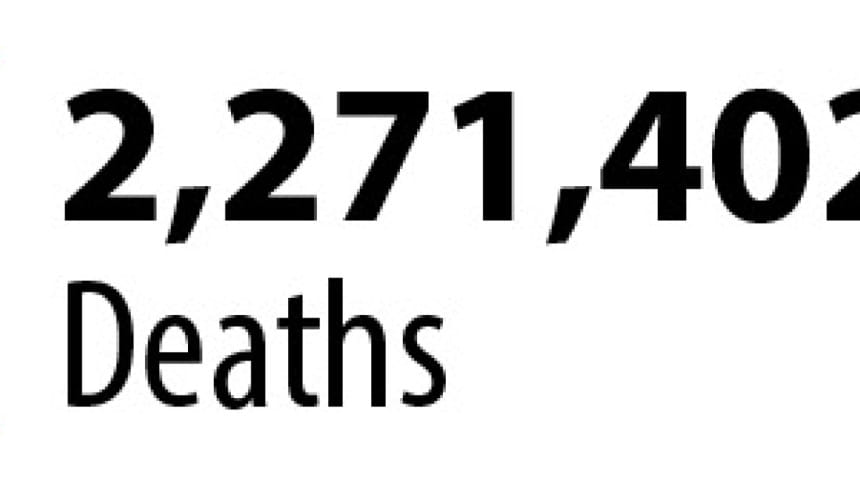Worldwide Covid Vaccination: Weak co-op a major barrier
Covid-19 vaccine nationalism is harmful for all, World Health Organization Director-General Tedros Adhanom Ghebreyesus said on Tuesday, and said weak cooperation between nations is a major barrier to achieving worldwide vaccination at the scale needed to end the coronavirus pandemic.
"Despite the growing number of vaccine options, current manufacturing capacity meets only a fraction of global need," the WHO director-general said in a piece published in Foreign Policy magazine.
"Allowing the majority of the world's population to go unvaccinated will not only perpetuate needless illness and deaths and the pain of ongoing lockdowns, but also spawn new virus mutations as Covid-19 continues to spread among unprotected populations," he wrote.
Countries around the world pin their hopes on vaccines as a way out of the pandemic, as WHO experts yesterday inspected a Chinese laboratory in Wuhan that some US officials said could have been the source of the coronavirus.
Russia is working to increase production of its Sputnik V jab in foreign countries after a report showed strong results for it.
And British pharmaceuticals giant GlaxoSmithKline and German biotech firm CureVac said they were teaming up to jointly develop a vaccine with the potential to counter multi-variants of Covid-19.
Vaccines are seen as the only way out of the pandemic that has infected nearly 104 million, left more than 2.2 million dead and devastated the global economy.
A WHO team searching for clues about the virus's origins went to the Wuhan Institute of Virology, one of the most-watched stops on a politically sensitive trip to the central Chinese city where the virus was first detected.
Peter Daszak, one of the experts, tweeted that the team had an "extremely important meeting today with staff" and a "frank, open discussion."
Nevertheless, top WHO officials, including members of the team, have played down the chances of finding definitive answers on the trip, including how the virus jumped from animals to humans.
"It is very unlikely that (on) such a short mission, (we) would have a very advanced understanding or definite answers" about the origins of the virus, WHO team member Hung Nguyen-Viet told AFP from Wuhan.
Saudi Arabia on Tuesday suspended entry from 20 countries, ranging from some neighbouring states to the United States, in a bid to curb a jump in coronavirus infections.
SPUTNIK V BOOST
Hopes for ending the pandemic were boosted by the publication of final-stage trial results showing that Russia's Sputnik V vaccine is 91.6 percent effective against symptomatic Covid-19 cases.
Russia and several other countries rolled out the vaccine last year, amid scepticism about its quality and concerns that it had been rushed.
But the results published in The Lancet, a leading medical journal, put it at par with Western-developed vaccines.
"In the very near future there are plans to establish production in foreign countries, which will satisfy the demand from more and more countries," Kremlin spokesman Dmitry Peskov told reporters.
Sputnik V has the advantage of being relatively cheap and can be stored at normal refrigerator temperatures, unlike the below-freezing storage required for shots from Pfizer and Moderna.
Spain said it was "open" to using Sputnik V if it is approved by European regulators.
German Chancellor Angela Merkel, citing "good data" for the Russian jab, said "every vaccine is welcome in the European Union".
But in Britain, a spokesman for Prime Minister Boris Johnson dodged questions as to why he was mum on Sputnik V, despite previously being quick to hail the success of rival jabs.
"Our focus is on now getting those vaccines that we've ordered out to people as soon as they've been deemed safe and effective, and they have passed all the trials," Johnson's spokesman told reporters.
At the same time, a study showed that Britain's own Oxford-AstraZeneca vaccine -- which has come under scrutiny over its effectiveness for elderly people -- significantly reduces virus transmission and is highly protective after a single dose.
"It slows transmission by around two-thirds, so it categorically supports the strategy that we're undertaking," Health Secretary Matt Hancock told BBC radio.


 For all latest news, follow The Daily Star's Google News channel.
For all latest news, follow The Daily Star's Google News channel. 



Comments